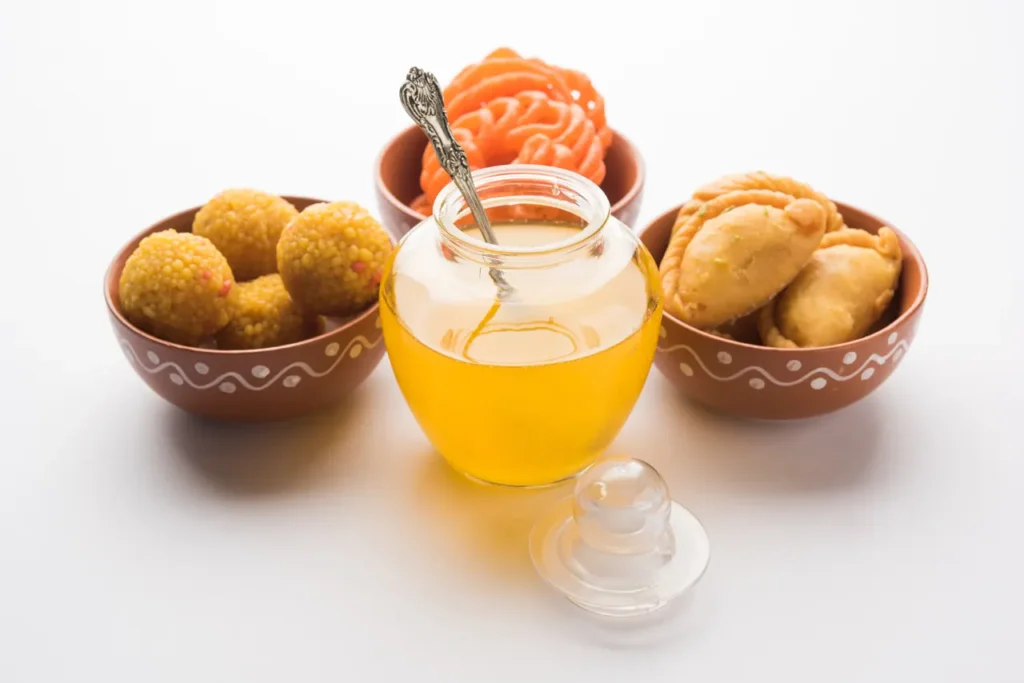
When it comes to cooking, there are a variety of oils and fats available on the market. One of the most commonly used oils is vegetable oil, while ghee, which is also known as clarified butter, has been used for centuries in Indian cuisine. Both oil and ghee have their own unique qualities and properties, but which one is the better choice for your health and cooking needs?
In this article, we will compare oil and ghee and analyze their benefits and drawbacks. We will also examine the nutritional value of both oil and ghee, and how they affect our health.
Vegetable oil is derived from various plants, including sunflower, soybean, and canola. It is a popular choice for cooking because it is versatile, affordable, and has a high smoke point. However, vegetable oil has a few drawbacks that you should be aware of.
One of the main drawbacks of vegetable oil is that it is high in omega-6 fatty acids, which can cause inflammation in the body. Inflammation is linked to a variety of health issues, including heart disease, arthritis, and cancer. Additionally, vegetable oil is often highly processed, which can strip it of its natural nutrients and make it less healthy overall.
Ghee is a type of clarified butter that has been used in Indian cuisine for centuries. It is made by simmering butter until the milk solids separate from the butterfat. The milk solids are then removed, leaving behind a pure, golden-colored fat.
One of the main benefits of ghee is that it has a high smoke point, making it ideal for cooking at high temperatures. Ghee is also rich in butyrate, a type of short-chain fatty acid that has been shown to improve gut health and reduce inflammation. Additionally, ghee is a good source of fat-soluble vitamins, such as vitamin A, D, E, and K.
However, ghee is also high in saturated fat, which can raise cholesterol levels and increase the risk of heart disease. It is also important to note that ghee is derived from dairy, so it is not suitable for those who are lactose intolerant or have a dairy allergy.
When it comes to nutrition, oil and ghee have their own unique properties. Oil is high in omega-6 fatty acids, while ghee is high in saturated fat. Both types of fat have their own benefits and drawbacks, and it is important to consume them in moderation.
In terms of vitamins and minerals, ghee is a good source of fat-soluble vitamins, while oil is often fortified with vitamin D. However, it is important to note that both oil and ghee are high in calories, so it is important to use them in moderation.
In conclusion, both oil and ghee have their own unique properties and benefits. Oil is versatile, affordable, and has a high smoke point, but it is high in omega-6 fatty acids and often highly processed. Ghee, on the other hand, has a high smoke point, is rich in butyrate and fat-soluble vitamins, but is high in saturated fat and is derived from dairy.
When it comes to choosing between oil and ghee, it ultimately comes down to personal preference and health goals. If you are looking for a versatile oil with a high smoke point, vegetable oil may be the best choice for you. However, if you are looking for a healthier alternative that is rich in nutrients, ghee may be a better option.
Regardless of which type of fat you choose to cook with, it is important to consume it in moderation and balance your intake with other healthy foods. Additionally, it is important to choose high-quality, unrefined oils whenever possible to ensure that you are getting the most nutritional benefit from your cooking fat.
When it comes to health, it is important to take a holistic approach and consider all aspects of your diet and lifestyle. While cooking with healthy fats is a good start, it is also important to eat a variety of nutrient-rich foods, maintain a healthy weight, exercise regularly, and avoid smoking and excessive alcohol consumption.
In conclusion, the choice between oil and ghee ultimately depends on your personal preferences and health goals. Both oils have their own unique properties and benefits, and it is important to consume them in moderation and balance your intake with other healthy foods. By making informed choices about the foods we eat and the fats we cook with, we can support our overall health and wellbeing.
Share this post:
Welcome to APNA RASOI, where you can get naturally created, delicious, and nutrient-dense food products. Your go-to place for freshly created, lovingly crafted food products.
We are so excited to share our love of organic and homemade food products with you, and we sincerely hope you enjoy every bite!
Copyright 2024© Apna Rasoi. All rights reserved.
